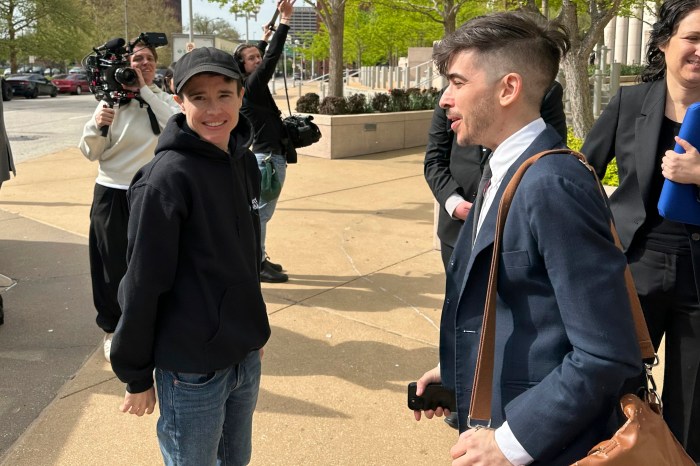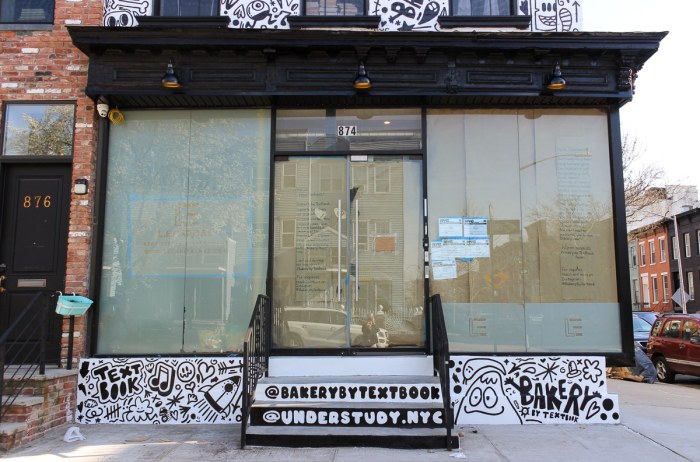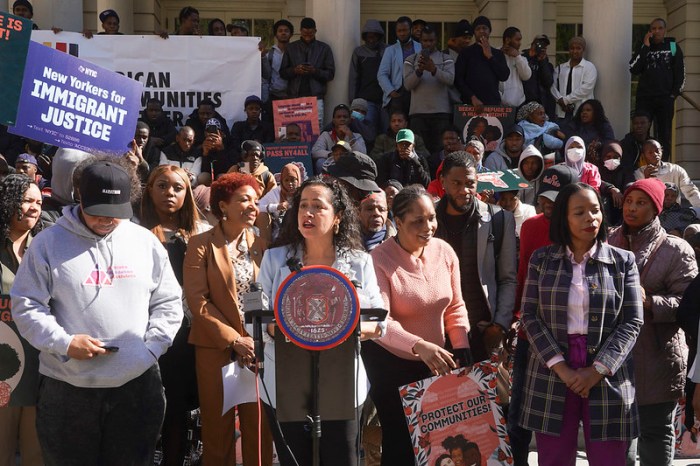Recently Noted:
BALLETS RUSSES “Ballets Russes” usefully renovates a neglected eminence, chronicling the company’s history 1909 as the inspiration of Sergei Diaghilev, the polymath Russian expatriate, who drew Matisse, Picasso, and Stravinsky into orbit around the nucleus of choreographers Mikhail Fokine, Léonide Massine, and dancer Vaslav Nijinksy. The highly wrought script manages the feat of compressing an 80-year history into exactly two vacuum-packed hours. Yet, it would have been more valuable still had it accurately conveyed the company’s uniquely progressive queer reality. Film Forum. (Ioannis Mookas)
––––––––––––––––––––––––––––––
BLACKMAIL BOY The original title for “Blackmail Boy,” the quasi-erotic queer thriller from the Greek filmmakers Michalis Reppas and Thanassis Papathanasiou, was “Oxygono.” That name elegantly reflected the theme of claustrophobia that leaves a family gasping for gratification in a small town in Greece, but it lacked the punch of intrigue-and homoerotic patina-needed to lure American LGBT film fest audiences. Quad Cinema. (David Kennerley)
––––––––––––––––––––––––––––––
BREAKFAST ON PLUTO Irish auteur Neil Jordan’s adaptation of Patrick McCabe’s Booker Prize-shortlisted novel “Breakfast on Pluto” fills out this fall’s boomlet of gay period dramas, joining “Capote” and the forthcoming “Brokeback Mountain” in revisiting the postwar decades through an ostensibly queer subjectivity. Landmark Sunshine, Lincoln Plaza, Loews 19th Street. (Ioannis Mookas)
––––––––––––––––––––––––––––––
CAPOTE Yes, in “Capote,” Philip Seymour Hoffman gives a terrific—call it Oscar-worthy —performance channeling gay writer Truman Capote. He has the author’s mannerisms down pat, his voice expertly attuned to delivering witty bon mots. It’s a perfect role for the actor/chameleon and he plays it to the hilt. Angelika, Clearview Chelsea, Brooklyn Heights. (Gary M. Kramer).
––––––––––––––––––––––––––––––
GAY SEX IN THE 70s Joseph Lovett’s film covers the sexually explosive 12-year period (1969-1981) between Stonewall and the onset of AIDS. Straightforward, funny, and titillating at the same time, this collection of memoirs are conveyed with humor and perspective. For those who have come of age in the era of safe sex and gay marriage, the film may present a startling revelation of what everyday life was like. Quad Cinema.
––––––––––––––––––––––––––––––
GOOD NIGHT, AND GOOD LUCK “Good Night, and Good Luck” painstakingly recreates a brief, shining moment in television history when the indefatigable Edward R. Murrow brought down Senator Joseph McCarthy. A testament to George Clooney’s skillful tenacity. Regal Union Square, Clearview Chelsea, BAM Rose Brooklyn (David Kennerley)
––––––––––––––––––––––––––––––
The Dying Gaul Though set in the film industry, this film is not really a part of the tradition of films set there. It takes place in this milieu only so executive Jeffrey (Campbell Scott) can offer struggling screenwriter Robert (Peter Sarsgaard) a Faustian bargain. The film’s true subject is power and how people without it exploit others to get it. Cinema Village. (Steve Erickson).
––––––––––––––––––––––––––––––
FAR SIDE OF THE MOON This visually stunning Canadian film written, directed, and starring Robert Lepage in two roles, is a highly stylized feature that will appeal to discerning viewers who like finding meanings in doubles and symmetry. All others, beware. The endless fascination with space serves as a terrific metaphor for the characters, and these themes are well represented throughout the film. Angelika. (Gary M. Kramer).
––––––––––––––––––––––––––––––
JARHEAD This film would have us believe that its soupçon of pessimism, cartoonish frat-house impudence, and potty-mouthed dialogue are somehow transgressive. Yet the genuine critique inscribed in Anthony Swofford’s memoir is diluted to a callow nihilism, imbibed as easily as it is forgotten, that leaves intact the pretexts for American invasion and simply ignores its real-world implications. Cineplex Village. (Ioannis Mookas)
––––––––––––––––––––––––––––––
KISS KISS BANG BANG Why does Shane Black hate gay people so much? “Kiss Kiss Bang Bang,” which he wrote and directed, features a queer character called Gay Perry (Val Kilmer), who says he keeps the moniker because “I just like the name.” If audiences are not sure about this tough guy’s sexuality, his cell phone ring is “I Will Survive.” Loews 19th Street, AMC Empire 25. (Gary M. Kramer)
––––––––––––––––––––––––––––––
Paradise Now Suicide turns a person’s life into a giant question mark. For suicide bombers, it’s doubly true. Everything in their life is seen as a prelude, making the suicide bomber a difficult character to fictionalize. Palestinian-born, Dutch-based director Hany Abu-Assad is certainly aware of the pitfalls, perhaps too much so. Landmark Sunshine, Lincoln Plaza. (Steve Erickson)
––––––––––––––––––––––––––––––
PULSE This film investigates what it means to be human. What differentiates us from computers or ghosts? “Pulse” offers a vision of isolation. Love is missing from these characters’ lives. Friendship is the only thing keeping them afloat. While “Pulse” was made before 9/11, some of its images now look like a premonition of the attack. IFC Center. (Steve Erickson)
––––––––––––––––––––––––––––––
RENT The film version of “Rent” starts off magnificently, Brechtian-style, with the cast members on an empty Broadway stage, each individually spotlighted, as they sing the show’s best song, “Seasons of Love.” Unfortunately, the movie has to reach hard to sustain that opening. Jonathan Larson’s musical captured the imagination of a new Broadway generation with its raucous score and youthful idealism set amidst the Lower East Side Bohemia. In 2005, however, the bloom is a bit off this particular rose. Clearview Chelsea, AMC Empire 25, BAM Rose Brooklyn (David Noh)
––––––––––––––––––––––––––––––
THE SQUID AND THE WHALE Set in 80s Brooklyn, Noah Baumbach’s film follows a family of four through a separation. Bernard (Jeff Daniels) is an aging writer whose career is going nowhere, while his wife Joan (Laura Linney) is about to publish her first novel. Daniels delivers his best work in years, perfectly capturing his character’s blithe self-absorption, assumptions of entitlement, and half-concealed issues with women and children. Angelika, Lincoln Plaza, Cobble Hill. (Steve Erickson).
––––––––––––––––––––––––––––––
gaycitynews.com


































